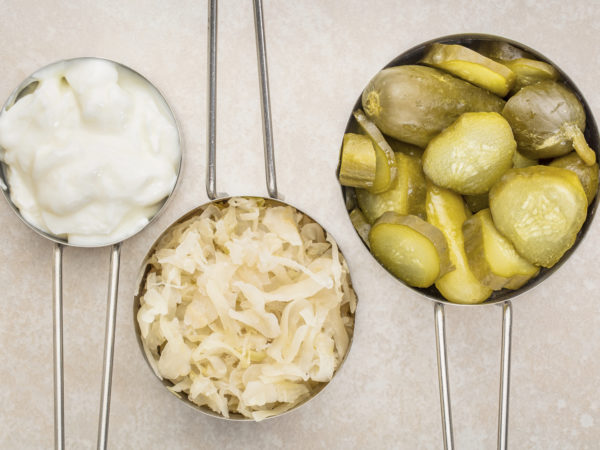Eating For A Healthy Microbiome?
I eat fermented foods because they are purported to improve the microbiota/microbiome in my GI tract. However, is there a way to tell if the microbiome is the “healthy” kind and providing benefits? How can I increase the beneficial microbiota?
Andrew Weil, M.D. | March 24, 2015

For those who aren’t familiar with it, let me first explain the term microbiome. It refers to the approximately 100 trillion microbes (bacteria, viruses and fungi) that live upon and, mostly, within us. This community outnumbers our human cells (that is, the ones with our unique DNA profile) by about 10 to one and makes up about two pounds of our body weight. In addition, the number of genes in all of those microbes is roughly 100 times greater than the number in our human cells.
Based on what we currently know, our individual microbiomes are very different from one another, and it appears that our own unique balance of organisms influences our health.
For example, we now know that obesity is associated with changes in the microbiome. Researchers who transferred bacteria from obese mice to lean ones have reported that the lean mice gained weight. We don’t yet know how this takes place, but one possible explanation is that an “obese” microbiome sends signals that alter how cells use sugar for energy, a change that leads the body to store excess fat.
I discussed your question about increasing beneficial microbiota with Justin Sonnenburg, Ph.D., assistant professor of microbiology and immunology at Stanford University and one of the world’s leading researchers of the microbiome. Dr. Sonnenburg explained that there is no particular type of microorganism in the gut that one should seek to maximize. Instead, simply increasing the diversity of microbes in your gut is likely to be beneficial. He noted that fermented foods are an effective way to add good bacteria to your gut, and said that even though most don’t take up permanent residence, during their transit they interact with your resident community of microorganisms and also with your intestines and immune system.
Dr. Sonnenburg notes that several studies have shown that daily consumption of fermented foods (or probiotic bacteria derived from fermented foods) can have a variety of beneficial health effects including protection from colds and flu and quicker recovery from antibiotic-associated diarrhea. He added that while it is difficult to know which fermented food is best for you and your microbiota, it is important to use trial and error to find ones that agree with your digestive system and affect bowel habits in a desired way. Dr. Sonnenburg also tells me that he tries to consume a variety of fermented foods (kimchi, sauerkraut, yogurt, kefir, pickles), and to have at least one of these daily.
You might be interested to know that Dr. Sonnenburg and his wife and fellow researcher Erica Sonnenburg Ph.D., have written a book, The Good Gut: Taking Control of Your Weight, Your Mood, and Your Long Term Health, to be published in June 2015. The book includes recipes and a menu plan to help nourish your microbiota as well as safe alternatives to antibiotics, and dietary and lifestyle advice to protect and enhance your microbiome.
Andrew Weil, M.D.
Source
nytimes/2012/06/19/science/studies-of-human-microbiome-yield-new-insights.html?pagewanted=all










